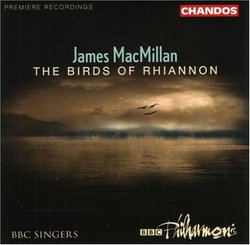| All Artists: James [2] MacMillan, James MacMillan, BBC Philharmonic Orchestra, Jonathan Scott, Margaret Feaviour, Elizabeth Poore, Karen Woodhouse, Elizabeth Poole, Eleanor Meynell, Micaela Haslam, Robert Johnston, Neil MacKenzie, Andrew Murgatroyd, David Roy Title: James Macmillan: The Birds of Rhiannon Members Wishing: 0 Total Copies: 0 Label: Chandos Release Date: 9/24/2002 Genres: Special Interest, Classical Styles: Opera & Classical Vocal, Forms & Genres, Concertos, Symphonies Number of Discs: 1 SwapaCD Credits: 1 UPC: 095115999721 |
Search - James [2] MacMillan, James MacMillan, BBC Philharmonic Orchestra :: James Macmillan: The Birds of Rhiannon
 | James [2] MacMillan, James MacMillan, BBC Philharmonic Orchestra James Macmillan: The Birds of Rhiannon Genres: Special Interest, Classical |
Larger Image |
CD Details |
CD ReviewsSo you don't like modern music? Rodney Gavin Bullock | Winchester, Hampshire Angleterre | 11/04/2002 (5 out of 5 stars) "The Scottish composer, James MacMillan, is one of the most distinguished of his generation. He is a master of all the techniques of composition
and tonality is important, making his music much more accessible than most contemporary composers. The title piece of this disc, The Birds of Rhiannon (2001) is a big work which the composer calls 'a dramatic concerto for orchestra with a mystical coda for choir'. It was inspired by an old Welsh legend and sets a poem written on this theme. This is by far the most difficult piece on this CD. It is largely atonal except for the final chorus, which is elegiac and lyrical. The atmosphere is very dark and there are a number of startling and original orchestral effects. A crack of the whips later on heralds a pause and the entry into MacMillan's 'mystical coda'. MacMillan's orchestration is quite masterly and it seems he can draw any sound he wants from his band.The Magnificat begins beautifully and mysteriously and the atmosphere is pastoral. This continues for some time, but at the words 'Glory be to the father', there is a tremendous, loud short outburst from the organ and the orchestra. This is repeated a number of times, the words filling the gaps, and after the 'amen', the piece ends quietly and peacefully.The Nunc Dimittis has a similar structure, but begins quietly with the basses singing in a rather sinister way. Gradually the music becomes more animated until again the words are interrupted by massive, explosive chords on the organ and orchestra. After several repetitions, the chorus has the last word and the work ends calmly.The Exsultet is purely orchestral and reveals a strange sound world. It starts with subterranean brass notes. The music gradually gets denser and faster. Later, a side drum enters the fray, together with untuned percussion, and a martial feel develops. Trumpets and trombones add fanfare-like flourishes as the music gets more and more agitated. At last, the music stops suddenly and, after a small pause, the organ comes crashing in again with a massive chord. This is answered by a soft and distant-sounding brass chord. This sequence is repeated a number of times, the organ being reinforced by the orchestra. At the end, the grumbling low brass brings the piece to an end.Of the two choral pieces, Mairi is complex, difficult but rewarding, whilst The Gallant Weaver is simple and sounds very Scottish.The performances by the BBC Singers and the BBC Philharmonic, conducted by the composer, are exemplary. The Chandos recording is state of the art. The insert notes by Stephen Johnson are interesting and they explained to me, at last, what post-modern means!" |
